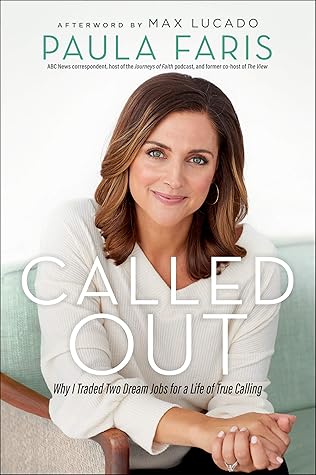More on this book
Kindle Notes & Highlights
by
Paula Faris
Read between
May 3 - May 21, 2022
sound crazy because I’m afraid of taking a break, walking away, finding an identity that’s not rooted in my ability to bounce back from adversity and dive back into work, regardless of how much I’m hurting myself or others.
I want the calling of my faith and the calling of my vocation to align, but how do I say this?
As he’d been with Moses, he’d always been with me. He’d parted seas for me, led me to the right people at the right times. Right?
Why was this fear of the loss of identity limiting my imagination for what was possible,
There are many things I wish I had known in my high school days, in college, and early on in my career. I wish I had known who I was apart from what I did or accomplished or the accolades I received.
Accomplishment. Achievement. Success. These were my drugs of choice. They still are. And Jackson Baptist High School was my first drug pusher.
When I scored an A in any class—high. When a teacher complimented me—high. When I was named first chair clarinet in the regional band—so high. Through success and achievement, I found a place, an identity, a sense of self-worth.
I was only as good as my next accomplishment, my next achievement, the next rung of the ladder I climbed. I was as good as the next thing I did.
That voice of fear was a constant tormentor, and I’d do anything to silence it. So if something wasn’t a natural fit, if it would lead to inevitable failure, I’d give up and walk away in an effort to silence the voices of potential failure. Soccer—I quit. Gymnastics—quit. Basketball, volleyball—I didn’t even try for fear of failure.
We know people by their successes—by what they do and how well they do it.
When God calls you, he’ll equip you.
she sacrificed her reputation, her pride, her everyday life.
Outside our comfort zones—that’s where we’ll find God waiting.
So often we lose sight of who we are and come to believe our vocation depends on our strength, our effort, and our abilities. We unroot our vocational calling from who we are in God and get all wrapped up in what we do, trying to find our identity in it. And when we suffer any kind of setback in it, the fear of being an impostor sets in. It’s a fear that affects news anchors, lawyers, and even preachers.
My life choices were showing that I was finding my identity in what I did instead of who I was.
I had reached the bottom. I was completely dependent on my addiction: achievement.
It was the only thing that made me feel l...
This highlight has been truncated due to consecutive passage length restrictions.
Was my identity so wrapped up in my career that I’d do anything and everything to advance it? Sure enough.
When God calls you, he will always equip you, but he equips you to an identity rooted in your faith calling, not in your career.
According to a 2014 Gallup poll of more than one thousand participants, over 55 percent of American workers say they gain their sense of identity from their job, and among college graduates, the number is even higher, at 70 percent.
“Until you really go through some adversity in your life where you have to apply that faith,” he said, “you don’t have an understanding of it.”
I’ve learned that our vocational calling, what we do, is nothing more than the vehicle by which we express that faith calling, the way we’re uniquely equipped to love God and love people in the world.


